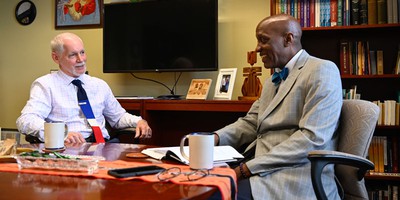Steve Durham, assistant director of Louisville Metro Department of Corrections, plans to speak to Presbyterians Wednesday as they make their way from the Presbyterian Center to local government offices to call for an end to the cash bail system.
Speaking during “Coffee with the Clerk” Monday with the Rev. Dr. J. Herbert Nelson, II, Stated Clerk of the General Assembly, via Facebook Live, Durham said that 85 percent of the people lodged at the city’s Main Jail – about 90 people were booked each day during 2018, while an average of 89 were released daily — are charged with what he called low-level crimes, including theft, passing a bad check, public intoxication, drug possession and trespassing.
People charged with even low-level crimes must remain in jail if they are unable to pay their bail. That can lead to job loss, family strife and other complications. Using the Hands and Feet Initiative begun during last year’s General Assembly in St. Louis, Presbyterians are partnering with the organization The Bail Project to put on Wednesday’s march, which will feature a number of speakers, including Nelson and Durham.
“Why put so many people in jail we aren’t afraid of and who aren’t a threat to us?” Durham asked Nelson. “In jails, there is overcrowding throughout the U.S., and it’s primarily related to the inability to pay bond.”
Jails should be places “to protect you and me from individuals who can harm us, or are a danger to us,” Durham said. When police and prosecutors have a strong presumption that an accused person has committed a more serious crime, “they need to remain in custody,” he said.
A growing number of studies shows that being in jail more than 24 hours “really starts to impact a person’s life,” Durham said. Employers grow less enthusiastic about holding a job open for the accused person as days go by. Those unable to raise bail money within 4-7 days after going to jail are 35 percent more likely to commit a crime than those released within 24 hours; for those who spend 8-14 days in jail, the recidivism rate goes up to 51 percent, Durham said.
“The evidence shows we are harming ourselves more by keeping a pretrial detainee in jail than by getting the person out on bond,” Durham told Nelson.
Durham, who’s been on the job since 2015, said local corrections officials are working to reduce the number of repeat offenders — it costs $80.51 each day to jail a person — through a program called Familiar Faces Action and Community Transition. With the goal of breaking the cycle of incarceration, homelessness and further incarceration, inmates are given a number of goods and services upon their release from the jail, including a backpack full of clean and seasonally-appropriate clothing and footwear, medication, hygiene items, public transportation, a temporary state ID card — even a ride to temporary housing.
“We walk them to the door, ring the doorbell, and say, ‘Tom, I want you to meet Bob,’” Durham said. “That’s the last image we want them to see — a handshake and a smile from a corrections officer who’s helping them to get a new start.”
Durham said a study looking at two years before the program started and the two years that followed the program’s inception showed that 40 percent of offenders “had not come back in two years. They are getting connected and getting the chance to live to their full human potential.”
“There’s something about that that touches the core of the human spirit,” Nelson replied. “It humanizes us a little bit more.”
“It doesn’t work all the time,” Durham responded, “but that doesn’t mean we are going to stop.”
The conversation about bail reform is going on across the nation, Durham said. California has done away with its cash bail system, and other states are considering similar changes in state law. Reform is taking place in statehouses as well as courthouses, he said.
Some judges have argued the current system is unconstitutional “when it’s unfair and unjust in its application” because it violates constitutionally-required due process and equal protection rights, Durham said.
One study showed that an equal number of people — 96 percent of those accused of a crime — show up for their court dates whether they’d been released for making their bail payment or remained in jail until they were scheduled to appear, Durham said.
The discretion that judges would be given by eliminating cash bail, including the right of victims to tell the judge how they’ve been harmed by a crime, “is the right system,” Durham said. It’ll also reduce the need some accused people feel to plead guilty for a crime they didn’t commit. “That’s an injustice you can’t overturn,” he said.
Nelson said Wednesday’s march “is more than a follow-up” to last year’s General Assembly march.
“It’s a recognition that we have a responsibility as a corporate citizen to be part of the growth and development of the city, to try to make Louisville a better place to live,” he said. “We have a responsibility to look beyond our collection plates.”

